I love to decorate my home for Halloween with vintage images. In the past, I have framed vintage skeleton illustrations and spooky bat drawings. I have just added to that collection with these human skull drawings.
The human skull is associated with Halloween probably due to its symbolism of death. Skulls are a stark reminder of our mortality.
In Mexico, they celebrate the Day of the Dead festival the day after Halloween. Were Mexicans decorate skulls in garish colors and patterns to commemorate the dead.
I have made a really fun illuminated spooky skull Halloween decoration with one of the skulls from this collection which is now hanging on my wall. There is also a skull in this Halloween patent print collection.
Facts About The Human Skull
The human skull is simply the bone structure of the head it comprises of the cranium and mandible. The skull’s main purpose is to protect the brain.
Looking at the human skull drawings it can also be seen that the skull also has the function of fixing the distance between the eyes and ears. This allows humans to have a stereoscopic vision and sound localization respectively.
- Even though it may look like one big bone there are actually 22 bones in an adult human skull. Some of these bones are labeled in the vintage human skull drawings below.
- The skull is not only made up of bones but cartilage and ligaments.
- There is only one moveable bone in the skull, which is the jaw bone (mandible).
- Male skulls are heavier, larger, and thicker than the female skulls.
- The skull of a female is rounded and has a less protruded mandible.
- The biggest hole in the skull is found in the area of the vertebral column that joins the skull’s base.
- An average of 785 pounds is needed to crush a human skull.
- A skull with crossbones is used as a symbol of poison or death.
- The shape and size of the skull differ in every ethnic group.
The Free Vintage Human Skull Drawings
Click on the title above the human skull drawing you want to download. A higher resolution image should open in a new tab in your browser.
If you right click on your mouse, the option to save the image to your hard drive should appear.
All these drawings are in the Public Domain so you are free to print and use them as you wish.
1. Teschio Umano _Antonio_Cattani
I don’t know much about this human skull drawing, except it is dated 1780 and is from a collection of the Museum of Fine Arts, Houston.
2. Portrait of A Man
This human skull art was actually painted on the back of a painting called A Portrait of A Man. The painting was by the Italian Renaissance painter Andrea Previtali, also called Cordeliaghi (1510).
3. Bidloo Ontleding – Human Skull Drawing
This anatomical drawing of the human skull is from a Dutch language edition of the Anatomy book, Anatomia humani corporis, 1685.
4. Forward Facing Skull
Drawing of a human skull, facing forwards from the Wellcome Library Collection.
The image shows the drawing of a skull, facing forwards. Plate 46, Volume II
1865 Crania Britannica: with notices of their other remains by Joseph Barnard Davis.
5. Front & Back Anatomical Skull
This anatomical drawing of the front and back of the human skull is from a French medical encyclopedia from 1792 “Encyclopedie Methodique- Systeme Anatomique”.
6. Man’s Place in Nature
This anatomical illustration of the Human Skull is from “Man’s place in nature, and other anthropological essays” (1890) by Thomas Henry Huxley.
Huxley was an English anthropologist specializing in comparative anatomy. He is known as “Darwin’s Bulldog” for his advocacy of Charles Darwin‘s theory of evolution.
“Human skulls have been found to differ from one another, not merely in their absolute size and in the absolute capacity of the braincase, but in the proportion which the diameters of the latter bear to one another.”
7. Cranium Drawing From Four Different Angles
This anatomical illustration of the human cranium from four different perspectives is also from the collection at the Wellcome Library, London.
The drawing is from “An atlas of anatomical plates of the human body” by Frederic J. Mouat, (1849).
8. Skull Drawing from Practical Human Anatomy
This labeled anatomical drawing is from “Practical Human Anatomy -(A working guide for students of medicine and a ready reference for surgeons and physicians” (1886).
9. Anterior view of Human Skull
Another anatomical human skull drawing from the Wellcome Library, London.
10. Human Skull Lateral View
Etching by B. Bossi, 1760 from Wellcome Library, London. Wellcome Images
11. Side View Drawing of Skull
A pen and ink drawing of a skull with a sepia wash, by C. Landsee, 1815.
12. Skull Front View
A front view illustration from “An Academic Physiology and Hygiene (1903).”
The labels on the skull bones are as follows: 1.
- frontal bone
- parietal bones
- temporal bones
- portions of the sphenoid bones, forming the backs of the orbits of the eyes;
- nasal bones
- superior maxillary bones
- inferior maxillary bone
- malar or cheekbones.
THE OSSEOUS SYSTEM. IJ 4. The Head. — The bones of the head are subdivided into those of the cranium or skull, and those of the face; of the former there are eight, and of the latter fourteen.
The bones of the skull axe separate in infancy and childhood; but in the adult, they become firmly united by irregular, immovable joints called sutures (Lat. sutura, from sucre, to sew or stitch), and thus form a strong, rounded case for the lodgement and protection of the brain and the organs of the special senses. These bones have been named according to their shape or location, as follows: the occipital bone, at the back and base of the skull, contains an aperture for the passage of the upper part of the spinal cord.
13. Skull & Hourglass
Skull and Hourglass (1537) from the Wellcome Collection, London.
14. Skull and Jaw Bone
From “Nouveau recueil d’od’ostéologie et de myologie, dessiné d’après nature“
(New collection of osteology and myology, drawn from nature), by Gamelin, Jacques 1779.
15. Human Cranium
This illustration is from the Norwegian National Library and is in the 1852 publication “Voyages de la Commission Scientifique du Nord, en Scandinavie, en Laponie, au Spitzberg et aux Feröe“.
Flower-wreathed skull, Pieter Schenk 1670-1713. Check out these other public-domain vintage Halloween art prints.
If you fancy, you can Buy Me A Coffee Here.
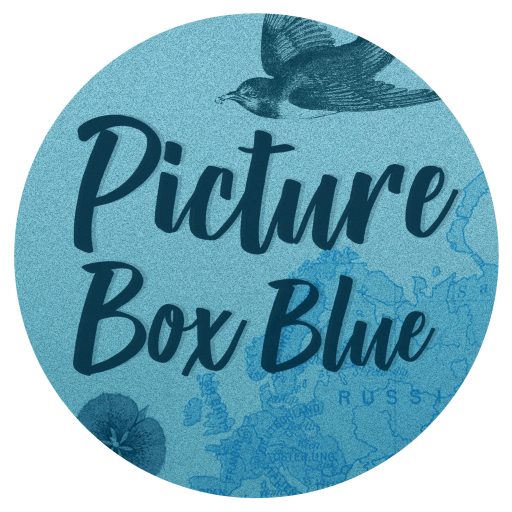
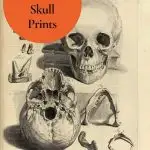
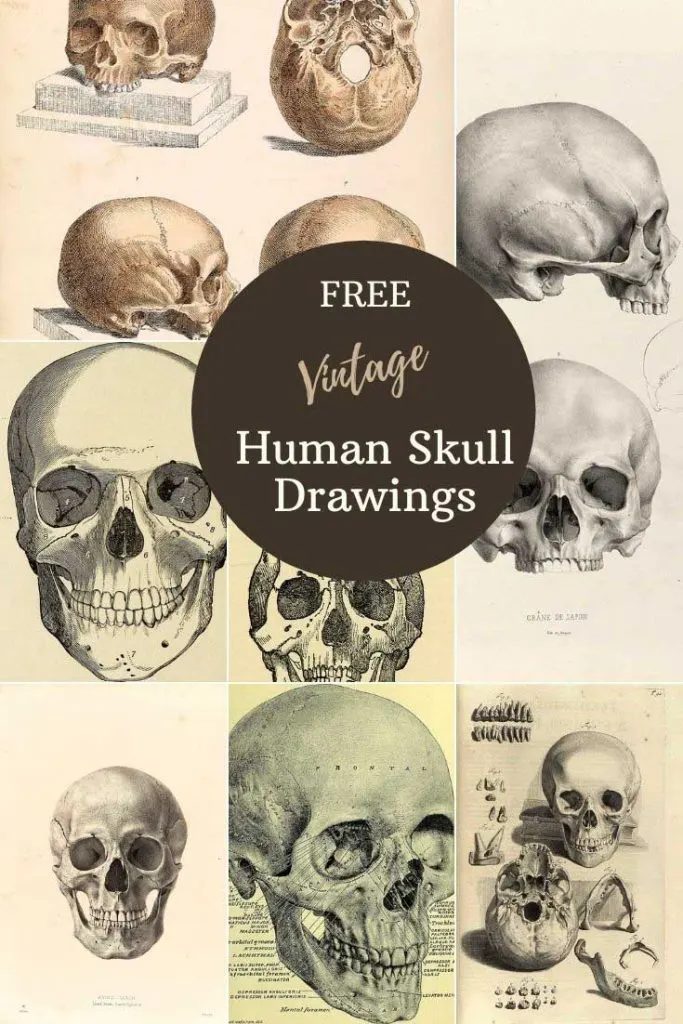
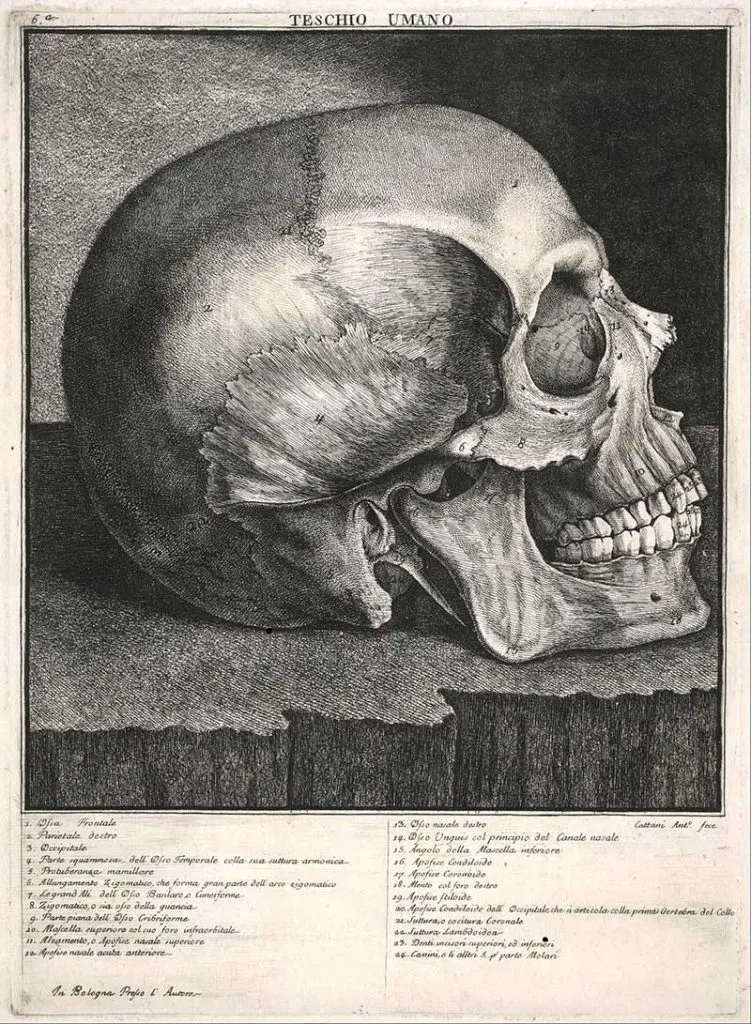
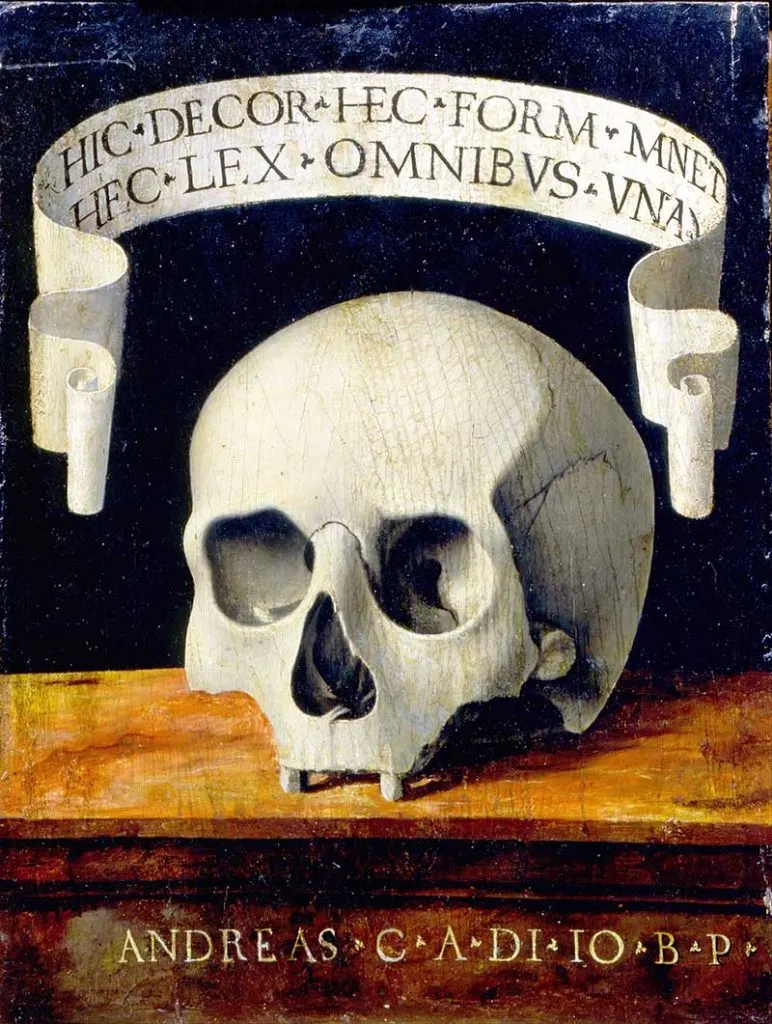
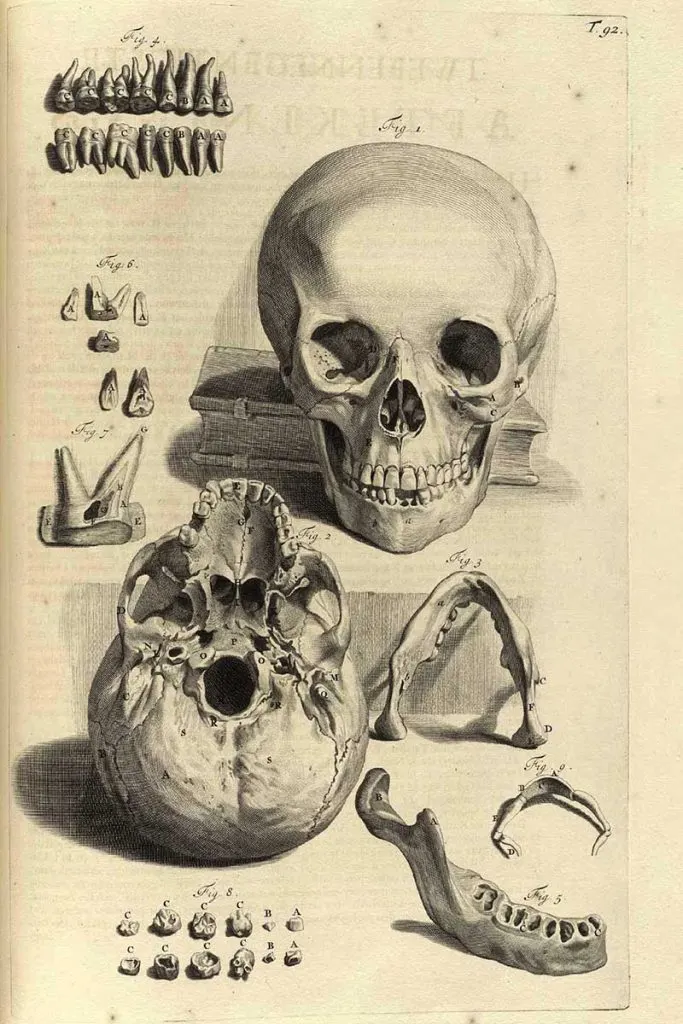
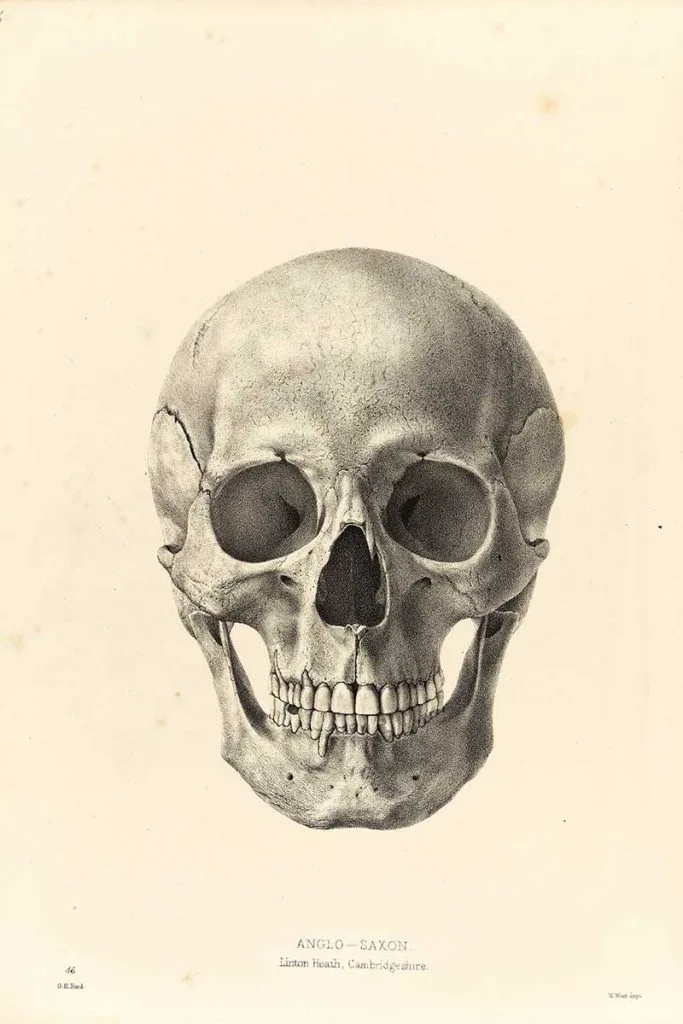
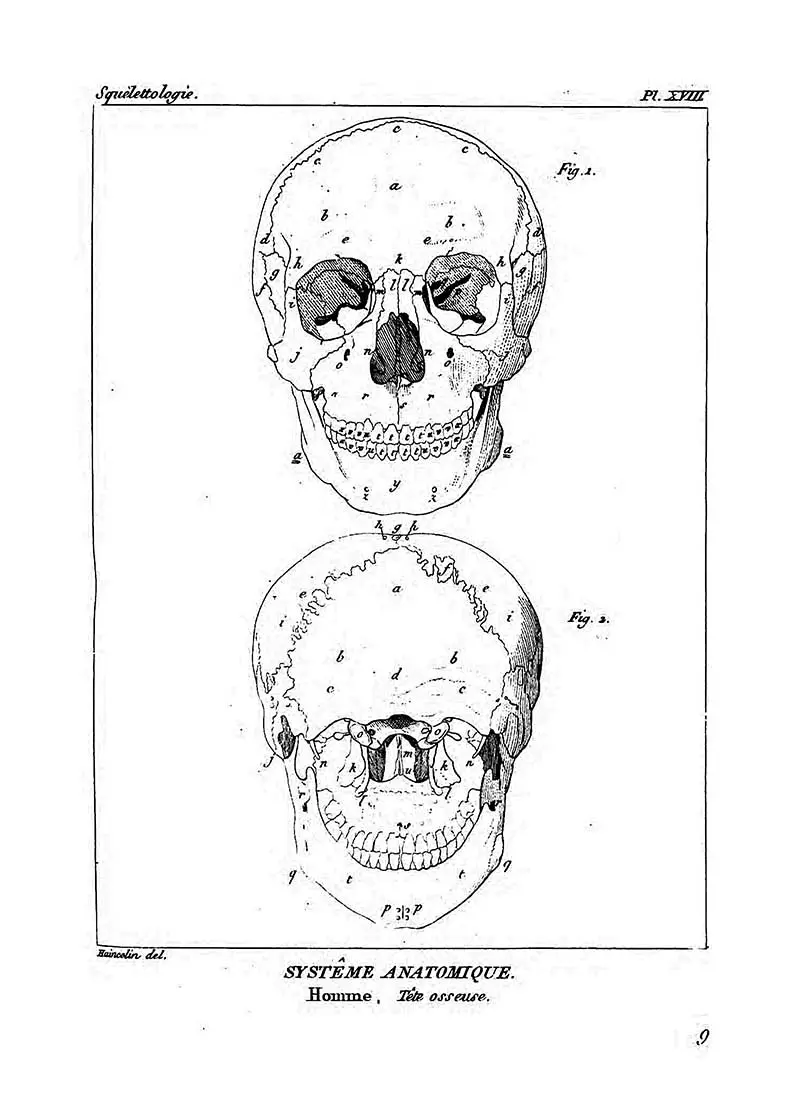
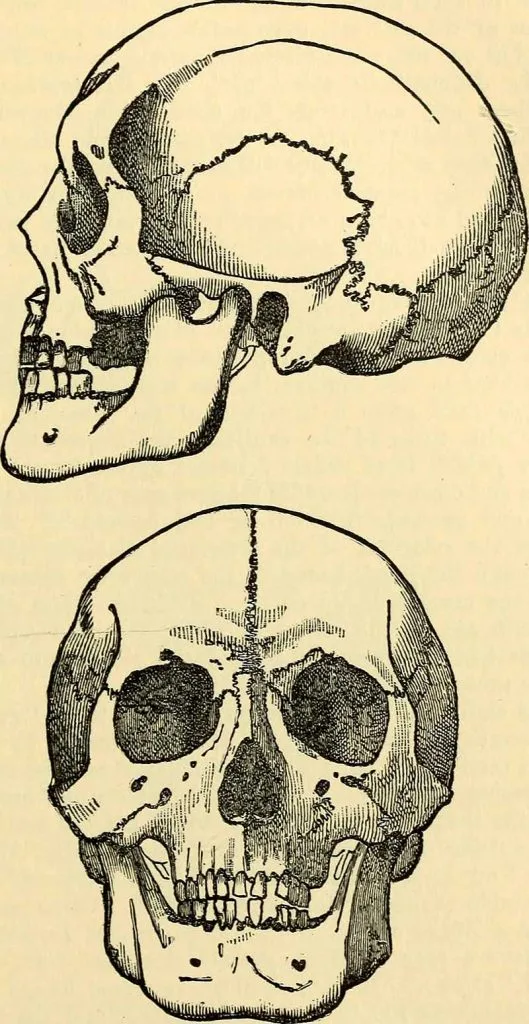
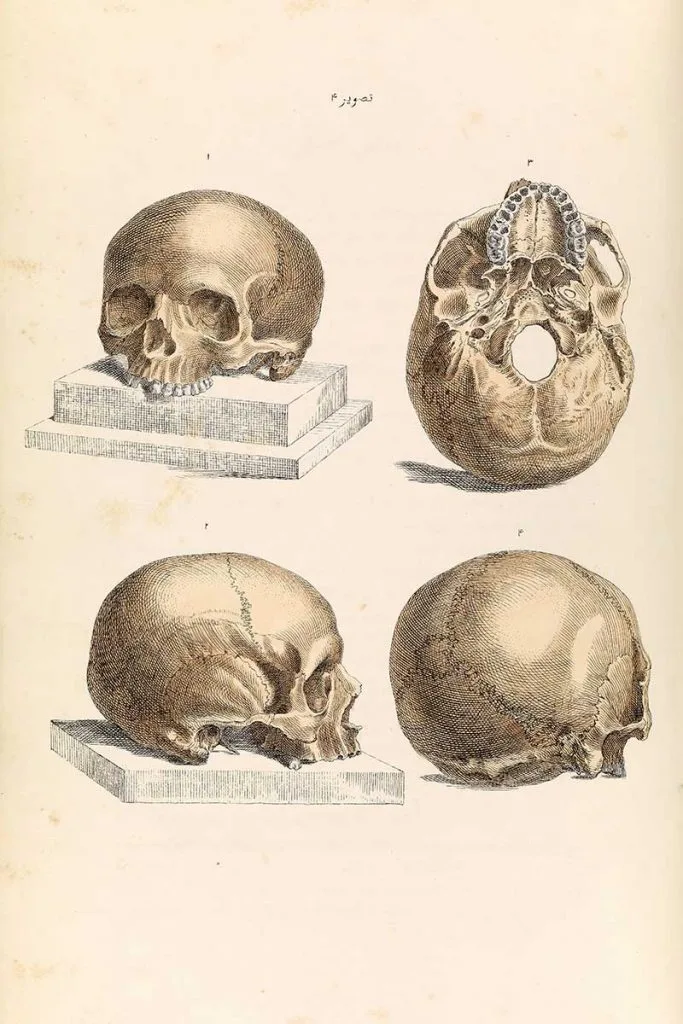
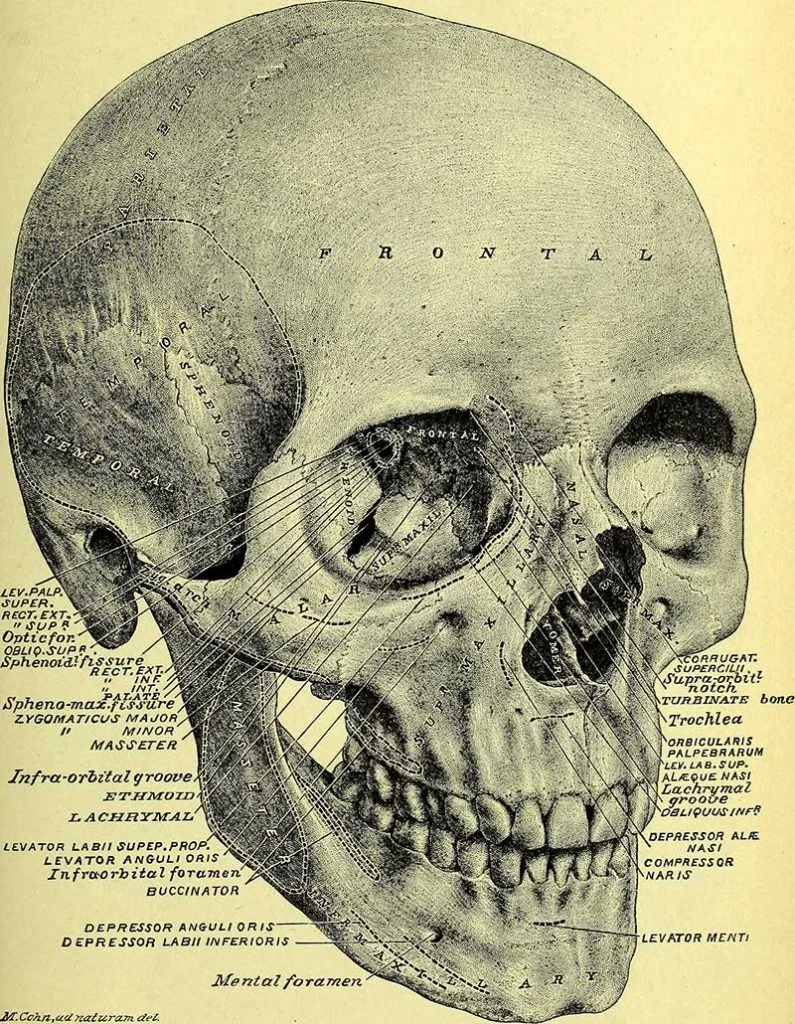
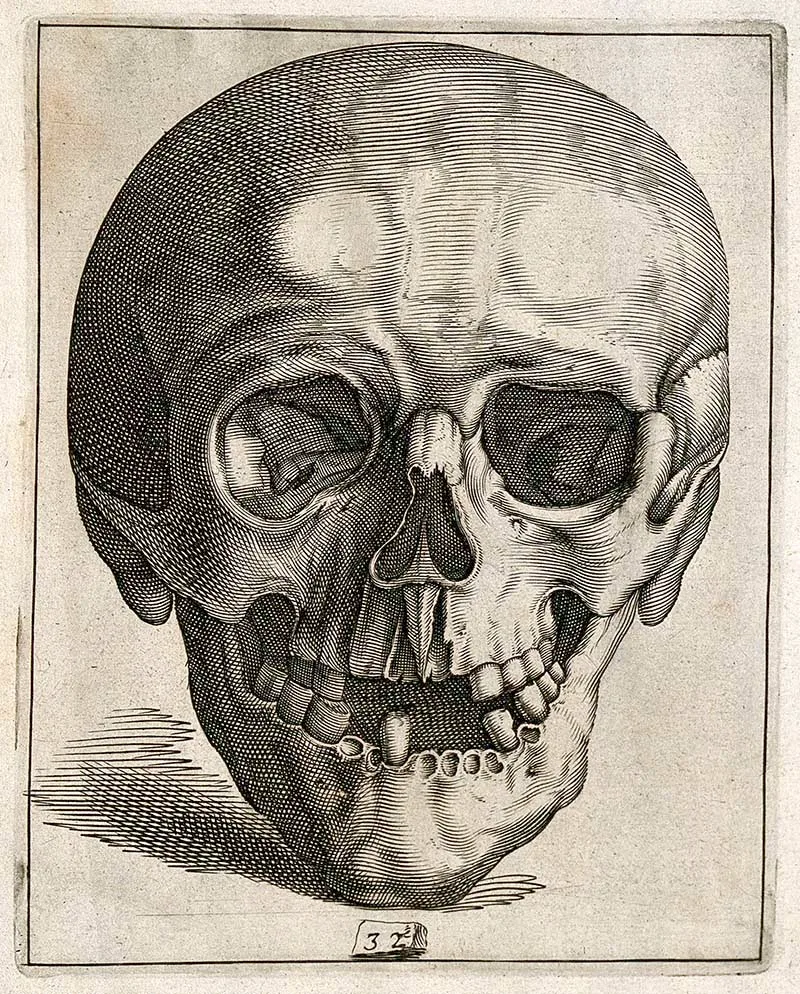
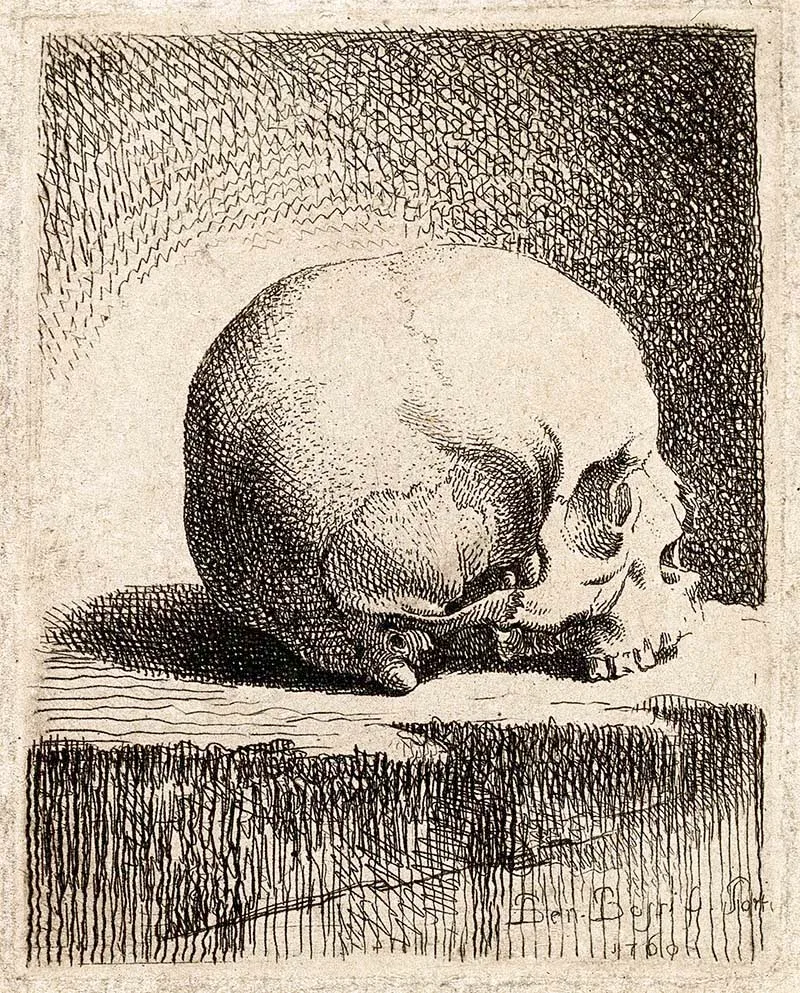
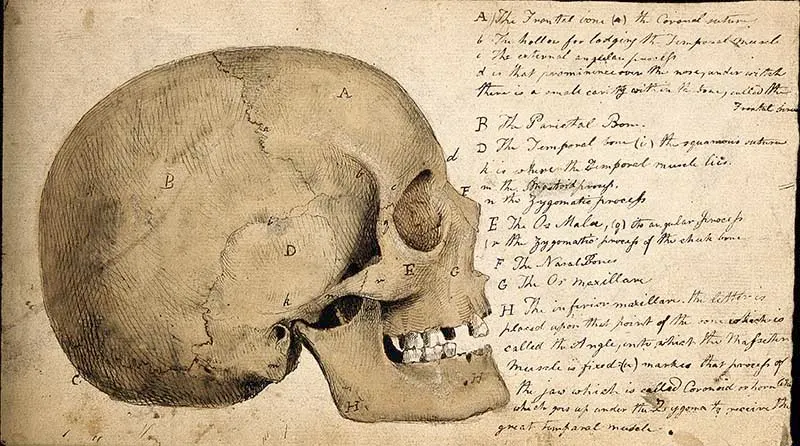
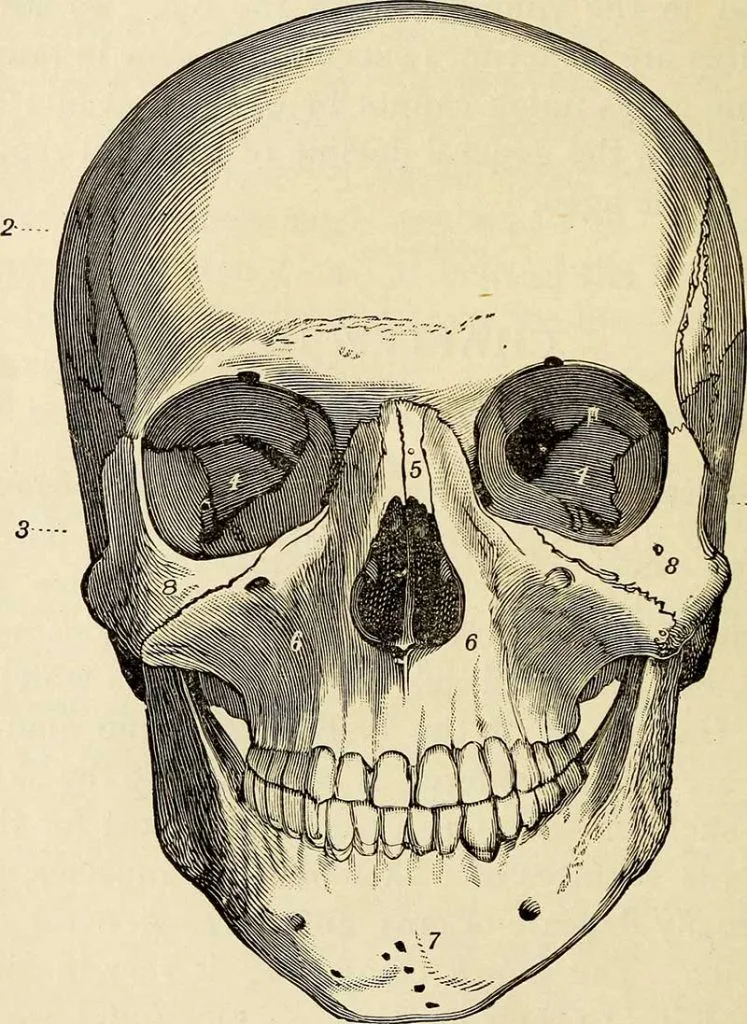
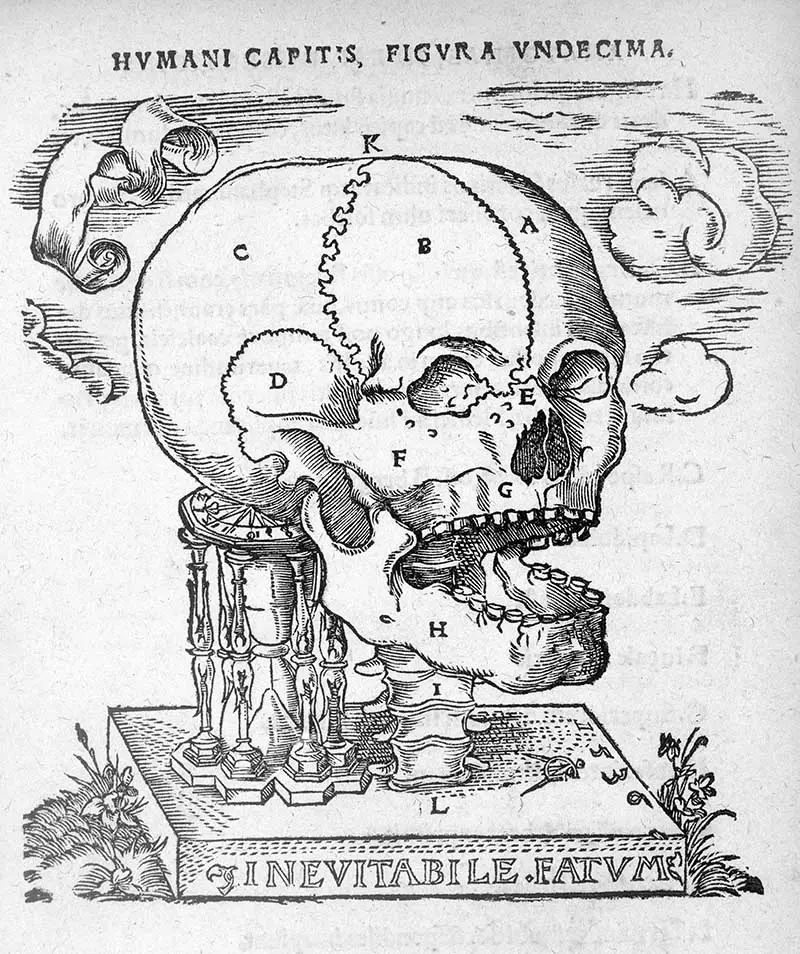
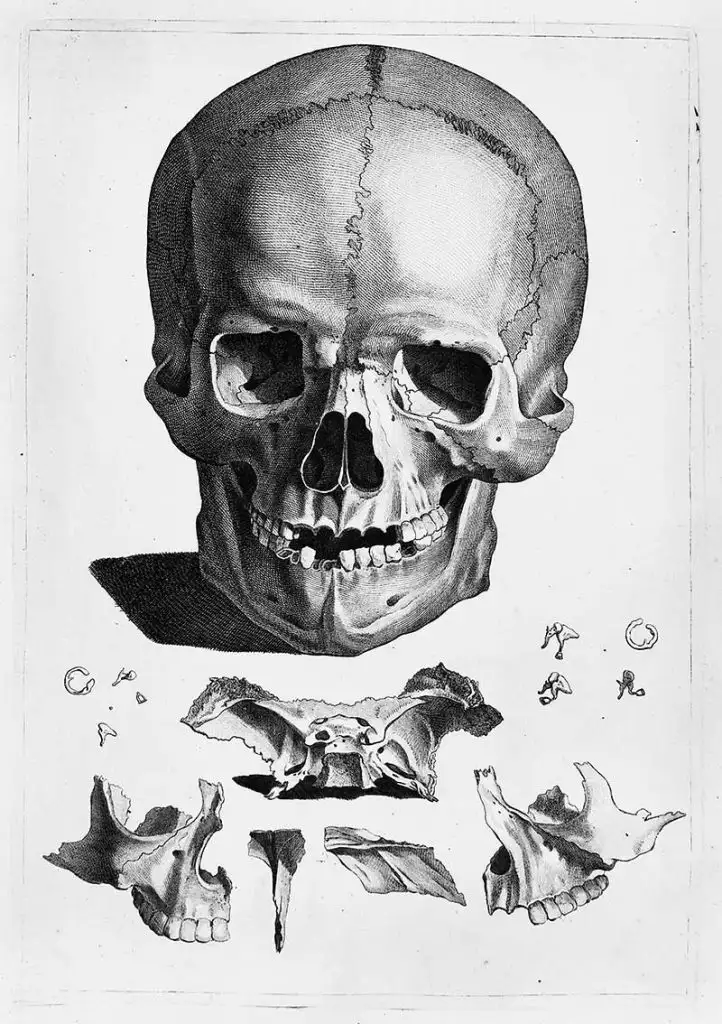
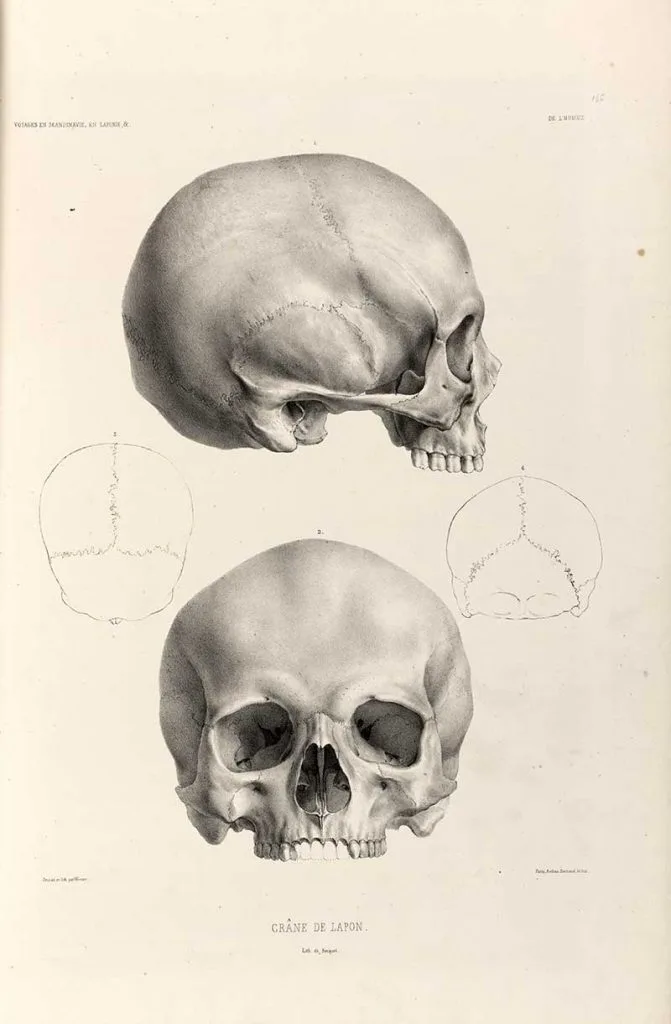
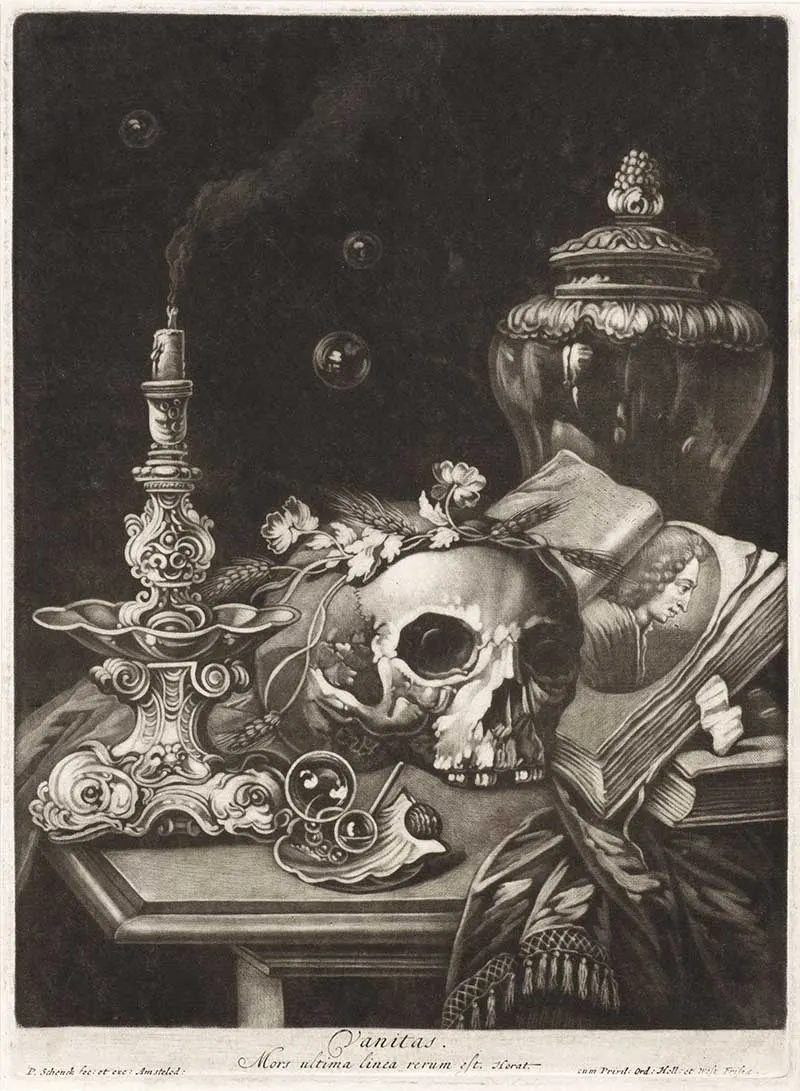
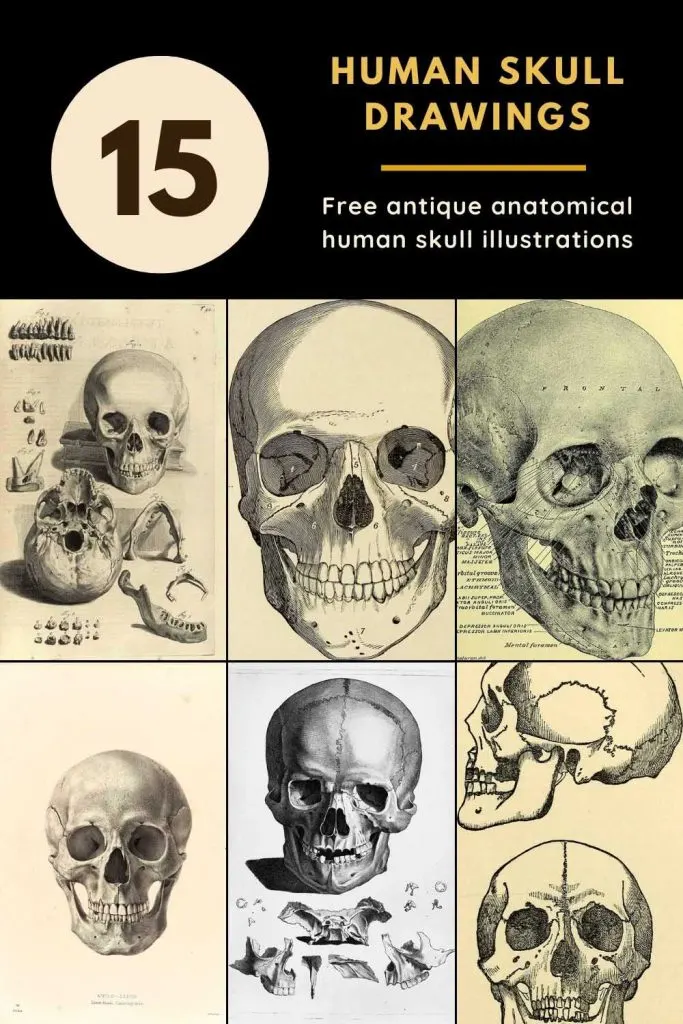
Suzy
Friday 30th of June 2023
Amazing. thanks for sharing. can you get any more anatomical / medical artwork? I saw the most amazing anatomical heart and other organs in the Royal Physicians college, Edinburgh.
claire
Sunday 2nd of July 2023
Thank you, I'll add it to my list of future posts.
nour eldin
Sunday 24th of October 2021
Can I use it as part of a design that will be printed?
claire
Monday 25th of October 2021
Yes, all the images are in the Public Domain so free to use.
Jen
Thursday 24th of December 2020
These are fantastic reference images. Thank you!
claire
Monday 28th of December 2020
Thank you, glad you can enjoy them.
Donna @ Modern on Monticello
Tuesday 15th of September 2020
These are something my husband would enjoy since he is in the medical field. The details on these are amazing. Thanks for sharing. #HomeMattersParty
claire
Wednesday 16th of September 2020
They are fascinating to look at, but also fun for Halloween.
Rachelle
Saturday 12th of September 2020
Perfectly chilling for Halloween!
claire
Tuesday 15th of September 2020
Thank you, that was the idea.